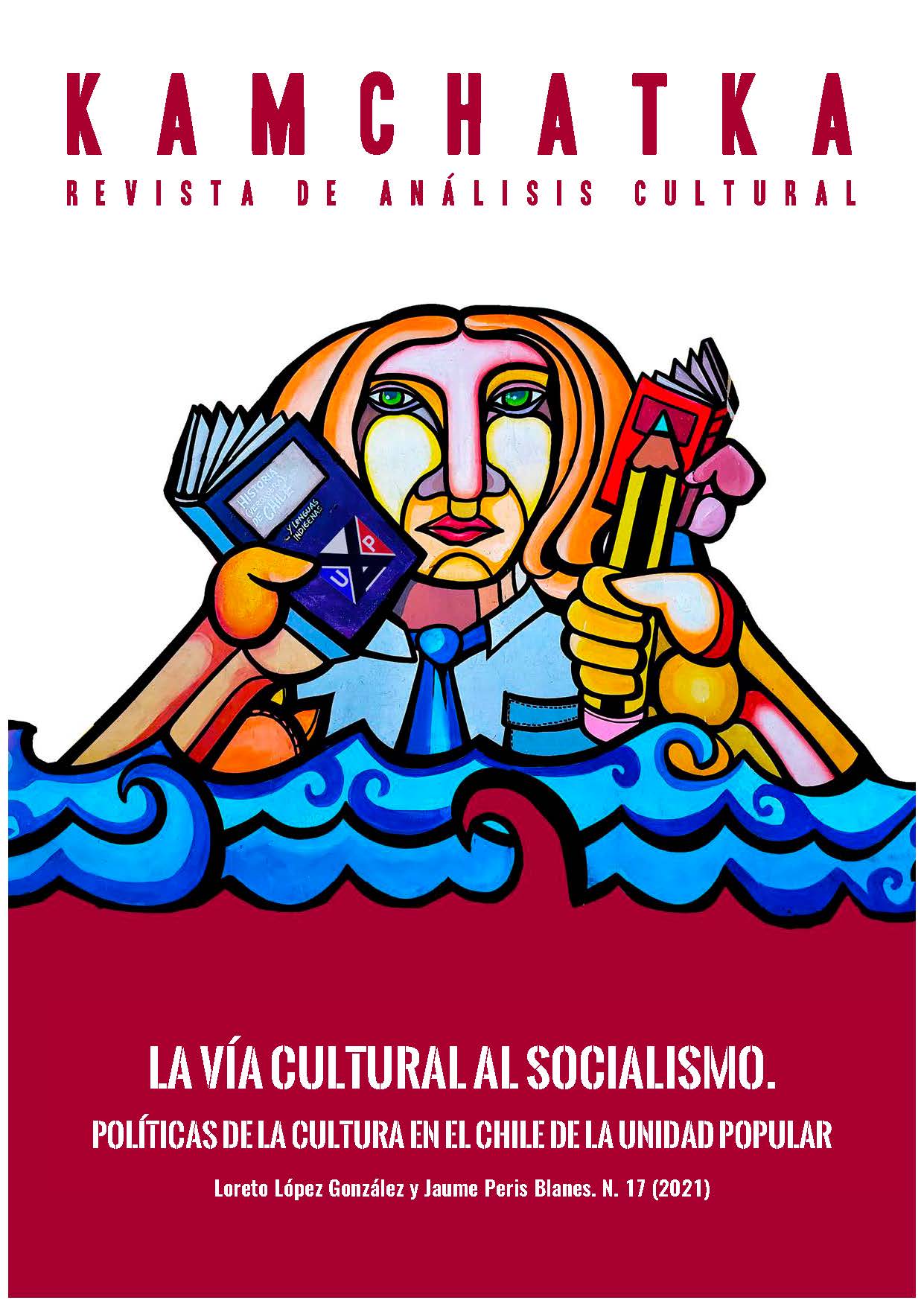The figure of the popular reader in Quimantú: pleasure, work and revolution
DOI:
https://doi.org/10.7203/KAM.17.18082Keywords:
popular reader, Quimantú, pleasure, literature, revolution Abstract
Abstract
Despite the fact that Quimantú is one of the most relevant cultural policies of the Unidad Popular, the figure of the popular reader has been scarcely studied. We propose to investigate the contours of this figure through the analysis of Quimantú’s editorial production. This way, the boundaries of the reading experience designed by the publishing house are revealed. We will see the complex place that pleasure occupies in this experience and how the definition of the popular reader ranges between an individual conscience and belonging to a mass that is oriented towards revolutionary political action. The figure of the popular reader not only explains a series of decisions in different magazines and books published by the publishing house, but also suggests an explanation about the impossibility of articulating literature as a properly revolutionary discourse during the Unidad Popular.
 Downloads
Downloads
 References
References
Bakhtine, Mikhail (1970). L’oeuvre de Françoi Rabelais et la culture populare au Moyen Age et sous la Renaissance. Paris: Gallimard.
Balibar, Étienne. “Le structuralisme: une destitution du sujet?”. Revue de metaphysique et de morale 45 (2005): 5-22.
Barr-Melej, Patrick (2017). Psychedelic Chile: youth, counterculture, and politics on the road to socialism and dictatorship. Chapel Hill: The University of North Carolina Press.
Bergot, Solène. “Quimantú: Editorial del Estado durante la Unidad Popular chilena (1970- 1973)”. Revista Pensamiento Crítico 4 (2004): 2-25.
Bianchi, Soledad (1995). La memoria: modelo para armar. Santiago: DIBAM-Centro de Investigaciones Diego Barros Arana.
Bowen, Martín. “El proyecto sociocultural de la izquierda chilena durante la Unidad Popular. Crítica, verdad e inmunología política”. Nuevo Mundo Mundos Nuevos (2008).
Canto Novoa, Nadinne. “El lugar de la cultura en la vía chilena al socialismo: notas sobre el proyecto estético de la Unidad Popular”. Revista Pléyade 9 (2012): 153-78.
Cavallo, Guglielmo y Roger Chartier (eds.) (2004). Historia de la lectura en el mundo occidental. Madrid: Taurus.
Chartier, Roger (2014). The Culture of Print: Power and the Uses of Print in Early Modern Europe. The Culture of Print. New Jersey: Princeton University Press.
Dorfman, Ariel y Mattelart, Armand (1971). Para leer al Pato Donald. Valparaíso: Ediciones Universitarias de Valparaíso.
Gilman, Claudia (2003). Entre la pluma y el fusil: debates y dilemas del escritor revolucionario en América Latina. Buenos Aires: Siglo Veintiuno Editores Argentina.
Harnecker, Marta. “Understanding the Past to Make the Future: Reflections on Allende´s Government”. Historical Materialism 3 (2003): 5-15.
MALDONADO, Carlos, y Vuskovic, Sergio (1970). Lenin o Marcuse. Santiago: Instituto de Investigaciones Marxistas de Chile.
Marcuse, Herbert (1983). Eros y civilización. Madrid: Sarpe.
Molina, María Isabel; Facuse, Marisol y Yáñez, Isabel (2018). Quimantú: prácticas, política y memoria. Santiago: Grafito Ediciones.
Moulián, Tomás. “La Unidad Popular y el futuro”. Revista Encuentro XXI 3 (1995): 21-29.
Moulián, Tomás (1993). El marxismo en Chile: producción y utilización. Santiago: FLACSO.
Rama, Ángel (1998). La ciudad letrada. Montevideo: Arca.
Ramírez, José; Cortés, Cecilia; Naranjo, Marcelo et al. “Marta Harnecker y el Marxismo Pedagógico. Itinerario del pensamiento de Marta Harnecker en la Revista Punto Final - Chile (1967-1969)”. VIIIas Jornadas de la Historia de las Izquierdas CeDInCI/UNSAM. Buenos Aires, Centro de Documentación e Investigación de la Cultura de Izquierdas (2015), pp. 333-342.
Rivera, Carla. “Diálogos y reflexiones sobre las comunicaciones en la Unidad Popular, Chile, 1970-1973”. Historia y Comunicación Social (2015), 345-67.
Rosenblatt, Louise (1996). El modelo transnacional: la teoría transnacional de la lectura y escritura. Madrid: Alianza Editorial.
Rosenblatt, Louise (2002). La literatura como exploración. México D.F.: Fondo de Cultura Económica.
Ponce, José Ignacio y Serra, María Loreto. “El discurso teórico-político de Marta Harnecker durante la Vía Chilena al socialismo, 1970-1973”. Revista Izquierdas 21 (2014): 83-104.
Sanjuan, Marta (2013). La dimensión emocional en la educación literaria. Zaragoza: Prensas de la Universidad de Zaragoza.
Subercaseaux, Bernardo (2000). Historia del libro en Chile (Alma y cuerpo). Santiago: LOM ediciones.
Subercaseuaxu, Bernardo (2007). Historia de las ideas y la cultura en Chile. Nacionalismo y cultura . Tomo IV. Santiago: Editorial Universitaria.
Subercaseaux, Bernardo (1982). Transfornaciones de la crítica literaria en Chile; 1960-1982. Santiago: CENECA.
Tinsam, Heidi (2009). La tierra para el que trabaja. Género, sexualidad y movimientos campesinos en la Reforma Agraria chilena. Santiago: LOM.
Veto, Sylvana. “Psychoanalysis and marxism in Chile. Two case studies: Juan Marín Rojas and Alejandro Lipschütz”. Psychoanalysis and History 19(1) (2017): 99-120.
Vicuña, Cecilia (1973). Sabor a mí. Cullompton: Beau Geste Press.
Documentos vinculados a Quimantú y a la Unidad Popular
Cabrochico. Nº1, 1971.
Cabrochico. Nº4, 1971.
Cabrochico. Nº5, 1971.
Gutiérrez, Joaquín. “Todos seremos lectores. Entrevista”. Chile Hoy 10 (1972): 21.
La firme. Revista de educación popular. Nº1, 1971.
La firme. Nº5, 1971.
La firme. Nº7, 1971.
La firme. Nº8, 1971.
La firme. Nº13, 1971.
La firme. Nº16, 1971.
« Imperialismo y dependencia ». Cuadernos de Educación Popular. 1972.
Paloma. Nº1, 1972.
Programa Básico de Gobierno de la Unidad Popular. 1970.
Downloads
Published
How to Cite
-
Abstract1057
-
Artículo PDF (Español)689
Issue
Section
License
This journal provides an immediate free access to the content on the principle that freely make investigation available to the public, which promotes an increased global knowledge exchange.
Unless otherwise indicated, texts published in this journal are under the license Attribution-NonComercial 4.0 by Creative Commons. These texts may be copied, distributed and publicly communicated whenever the publication’s author and title are quoted and whenever they are not used for commercial purposes. In any case, intellectual property of the articles and its potential economic rights entirely belong to its authors.
The full license can be consulted on https://creativecommons.org/licenses/by-nc/4.0/. We encourage authors to disseminate papers published in Kamchatka. Journal of cultural analysis electronically, in institutional digital repository or in their websites.





